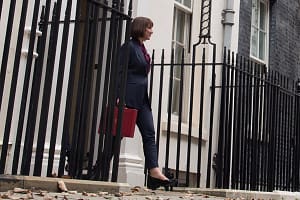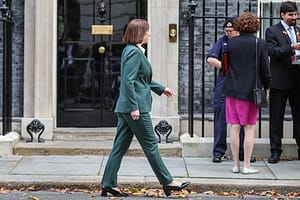Opinium’s latest poll reveals that in the last two weeks, Labour has maintained a healthy lead of 15 points, with 44% (n/c) of the vote share compared to 29% (n/c) for the Conservatives.
The Liberal Democrats have 9% (+1) of the vote share and the SNP remain on 3%. Reform UK have remained on 7% (n/c) while the Green Party have dropped from 6% to 4% (-2).
Rishi Sunak’s approval rating has dropped back to -14% (-6) after improving in the last poll, with 28% approving (-3) and 43% disapproving (+4). Keir Starmer is on -2 (-2) with 31% approving (n/c) and 33% disapproving (+2).
Half expect Labour to be largest party at the next election
Half (50%) of voters expect the Labour Party to be the largest party at the next general election – including 30% expecting a Labour majority – while only 22% expect the Conservatives to be the largest party.
2019 Conservatives are more evenly divided. Two in five (40%) still expect Labour to be the largest party while 35% expect the Tories the Conservatives to be the largest party.
Labour support is down to cost of living, health and public services, Tory support is economic policy, immigration, and leadership.
When asked why they are voting for the party they chose, 43% of voters said their party’s cost-of-living policies, health policies (30%), economic policies (30%) and their leadership (28%).
Issues such as approach to public services (22%), immigration policies (20%) and approach to EU (20%) fall further down the list.
The three most common reasons current Labour voters gave for their choice were:
- Cost-of-living policies (56%)
- Health policies (44%)
- Approach to public services (32%)
The three most common reasons current Conservative voters gave for their choice were:
- Economic policies (43%)
- Immigration policies (37%)
- The leadership (35%)
Crime crackdown
One in seven (16%) now say crime is one of the most important issues facing the country, up from 14% in February and 11% in November last year.
30% trust a Labour government led by Keir Starmer to tackle the issue vs. 23% choosing a Conservative government led by Rishi Sunak.
Only 20% have confidence in the UK government to successfully tackle and reduce crime, while 71% are not confident. Similarly, only 27% have confidence in the courts and justice system to do the same, and only 31% have confidence in the police.
Anti-social behaviour
While the Conservatives focus on antisocial behaviour, this is only in 6th place on the list of crimes the public want the UK government to prioritise reducing.
Two fifths (60%) want to reduce knife, gun, and other violent gang offences, while half (50%) want reducing rape and sexual assault to be a priority. This is followed by reducing other violent crime (32%), murder (28%), domestic abuse (20%), antisocial behaviour (19%).
Loss of trust a barrier to Conservative revival
For those 2019 Conservatives who no longer say they will vote Conservative, 52% say the main reason is that they have lost trust in the Conservatives – significantly larger than any other answer. One in seven (16%) say a key reason is because the Conservatives are running country poorly, and 7% blame the poor premiership of either Johnson or Truss.
Similarly, amongst the smaller group who have directly switched from the Conservatives to Labour, 48% say they have done so because they trust Labour more than the Conservatives.
Adam Drummond, head of political and social research at Opinium said, “Generally Labour are ahead on vote share because of the cost of living situation and an absolute cratering of trust in the Conservative party. Voters think that the Conservatives are more likely to share their views on crime than Labour are when we ask what approach they want and what they think each party wants.
“However, despite this, Labour lead on the issue overall and the government is struggling to get traction because voters don’t believe that they are capable of improving things. The lack of faith in institutions like the police or the courts and justice system are a symptom of a general ‘stuff in Britain doesn’t work’ feeling that the government have to tackle if they are to have any chance at the next election.”






Leave a Comment